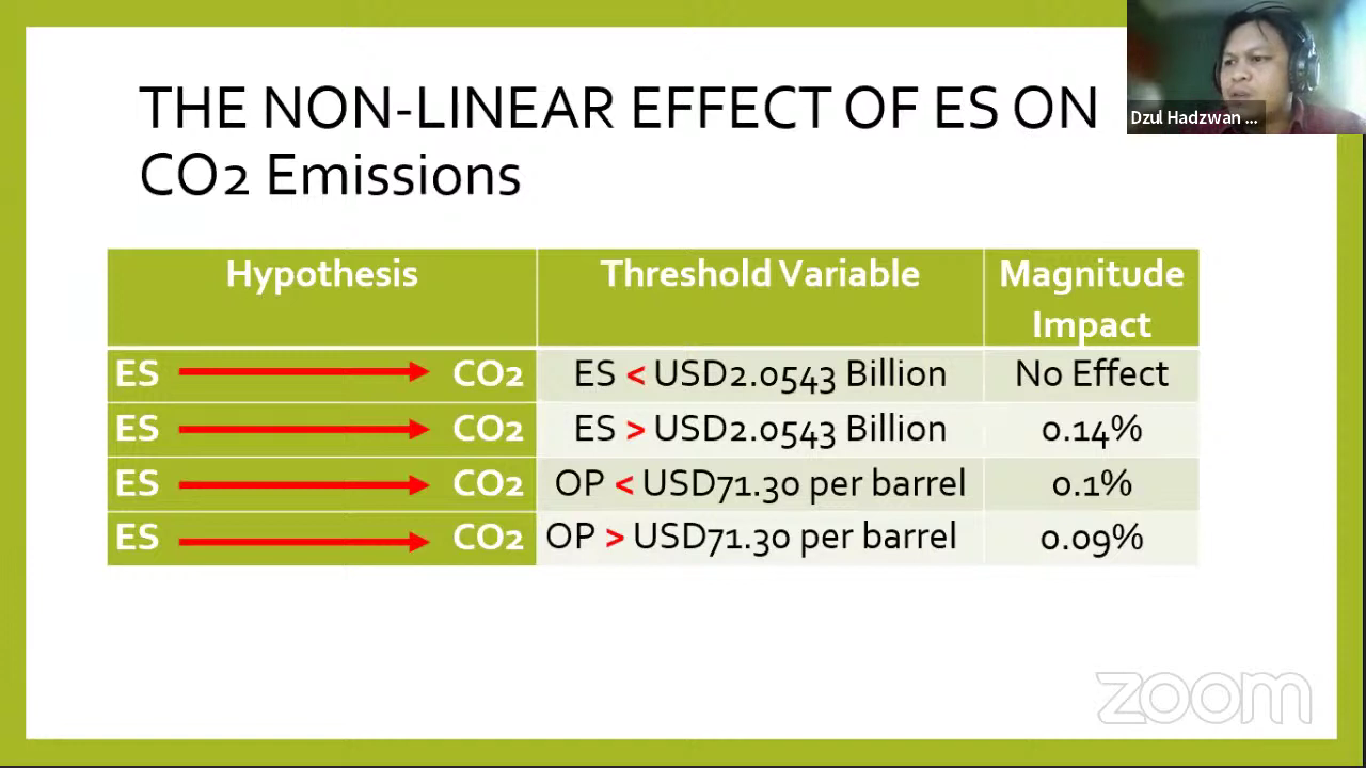
Online, 26 Nov 2021
The ASEAN Researchers Network on Energy and Climate Change (ARNECC) Paper Talks just reached its ninth episode! On 24 November 2021, the talk discussed a recent article “The relationship between energy subsidies, oil prices, and CO2 emissions in selected Asian countries: a panel threshold analysis”, which published by Australasian Journal of Environmental Management. The presentation was brought by professor of Universiti Sains Malaysia, Dr. Hooi Hooi Lean, and lecturer of Universiti Malaysia Sarawak, Mr. Dzul Hadzwan Husaini, who both are authors of the paper. The event was moderated by ACCEPT Research Analyst, Ms. Monika Merdekawati.
Asia contributes around half of the CO2 emissions globally. In the other hand, many Asian countries are dependent on fossil fuel products, causing dilemma between prioritizing economic output and lowering CO2 emissions. The energy subsidies come into the system to ensure the wealth of the people, hence encourage economic activities. But to some extent the subsidies promote inefficient energy use by the customer who actually could afford higher energy price.
CO2 emissions could be reduced by lowering energy subsidies but such effort induces higher energy prices resulting in lower demand and economic activity, which might cause energy inaccessible to some portion of the society. Hence, Asia including ASEAN countries, need to balance the economic growth and environmental pollution. From the total of 20 sample countries, the paper analyses 4 ASEAN member states they are Brunei, Indonesia, Malaysia, and Thailand.
The paper aims to explore the nonlinear relationship among energy subsidies, oil prices, output and CO2 emissions in selected oil producing countries in Asia. The paper also examines the impacts of certain threshold values of energy subsidies and oil prices on CO2 emission. In addition, a threshold regression model is employed to identify the asymmetric impact of the exogenous variables.
The study suggests that if Energy Subsidy (ES) is less than USD 2.0543 billion, there will be no magnitude impact on CO2 emissions. However, if the ES is beyond such number, the impact will increase to 0.14%. For Oil Price (OP) case, if the OP is less than USD 71.30 per barrel, the impact will be 0.1%. Whereas if the OP is more than such price, the impact will be 0.09%.

The study concludes that energy subsidy will result in higher CO2 emissions when it is above USD 2.0543 billion and that the impact is higher when the oil price is below USD 71.30 per barrel. The study also discovers that an increase in capital and labour were found to cause higher CO2 emissions. The research suggests a couple of policy implications. One of them is to introduce an energy subsidies rationalism program to incentivise energy saving practice. The second implication is to execute campaigns to improve environmental quality.
Ms. Monika then leads the event to Q&A sessions. There are questions related to the data, policy implications, and carbon pricing. As for the data, the study uses energy subsidies of renewable and fossil fuel. In addition, emissions data used is the total CO2 emission.
Mr. Dzul explained that energy subsidies have benefits in promoting competitive cost and increase welfare. We need to admit that the absence of energy subsidy will affect the economy. Therefore, we need to ensure that energy subsidy is productive. Distribution of energy subsidies need to be managed since removing it will significantly impact some sectors.
Furthermore, subsidies rationalism program is highlighted in this study. ASEAN countries have started such program to reduce fiscal pressure, improve environment quality, and climate change mitigation. For instance, Mr. Dzul pointed out what President Joko Widodo has mentioned a few years ago that we need to reduce energy subsidy and invest the money for renewable energy. In addition, Dr. Hooi mentioned that Malaysia has also planned the subsidies rationalism program.
Related with the use of carbon pricing in energy sector, Dr. Hooi explained that ASEAN countries, with developing countries as the majority, could have drawbacks for the implementation of carbon tax since they are still recovering from the pandemic. There is dilemma between energy subsidies, economic growth, and environmental pollution, which the government are still struggling to balance.
Ms. Monika closed the event by promoting ARNECC, which links scholars, analyst, researchers, and other stakeholders across ASEAN to enhance broader knowledge and insights related to energy and climate change. Therefore, the coherence between the ASEAN energy and climate policies will be improved, contribute to more climate-friendly development of the energy sector.
(SNF).